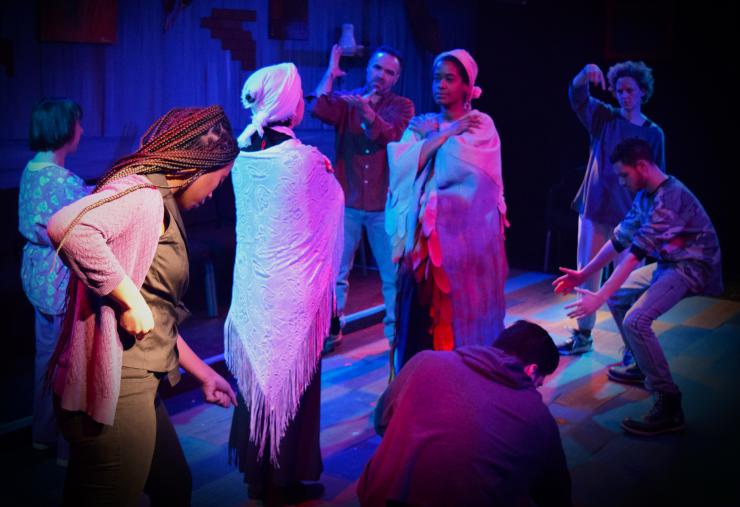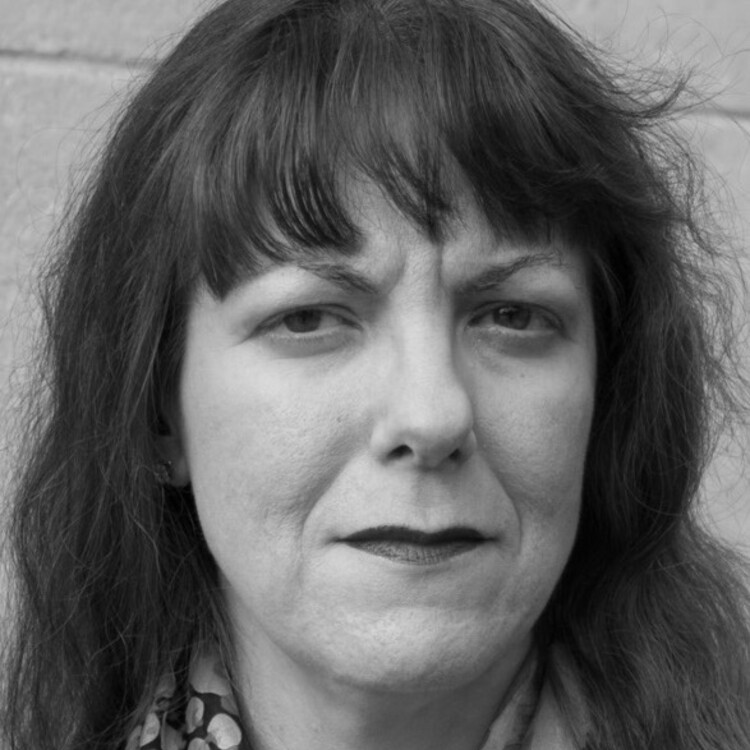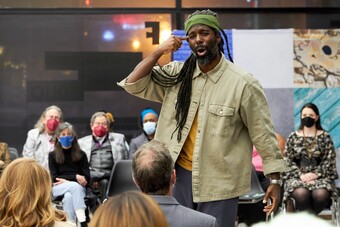This Thing of Hers
Caridad Svich Reflects on Her Body of Work
Que Onda? (“What’s up?”) are interviews with comadres and compadres meant to shine a light on what small or large companies; independent artists or ensembles are doing around the country. Café Onda is an evolving publication. Sit back, take a break, and catch up on what's up in the Latina/o theatre scene. In this installment, emerging playwright Emilio Rodriguez interviews OBIE Award-winning theatremaker Caridad Svich about her work.
Emilio: Your work is so beautifully poetic, which can be challenging for actors. What qualities does an actor need to possess to do your work justice?
Caridad: Wit, intelligence, fearlessness, vulnerability, musicality, and honesty—that’s what I always look for in actors. There’s a line in my play 12 Ophelias where Ophelia says that she likes the “edges” of words. For me, that line is a kind of clue for actors as to how to approach my work. Find the visceral connection. Writing for live performance is about writing for the body. It’s all in the body.
Emilio: I was interested to learn that you moved around a lot growing up. How has that sense of a nomadic childhood affected your writing?
Caridad: You write from and through the instrument of your mind/body/heart and experience, and also imagined experience. That said, living in one place for most of your life is very different than living in several places especially during childhood and adolescence. You are constantly being uprooted and asked to adjust to new surroundings. There is always a push-pull in my work between longing for settled life and embracing the unsettled. There is an interest always in juxtaposing various physical and geographic terrains, and transnational ones into one story world. There is a desire to mix linguistic registers and code-switch between and among languages. Very rarely, and when I do it is quite purposeful, do I write from and about one designated, limited terrain. I am a child of immigrants (from Cuba and Argentina, and my parents were also children of immigrants, from Spain and Croatia, respectively). There are many stories of migration and displacement and dislocation and re-location in my family. I embrace hybridity and a syncretic way of seeing the world in my life and in my work.
There is always a push-pull in my work between longing for settled life and embracing the unsettled. There is an interest always in juxtaposing various physical and geographic terrains, and transnational ones into one story world. —Caridad Svich

Emilio: One thing that struck me about one of your new plays, agua de luna (psalms for the rouge), was the use of truncated sentences. Can you share why this syntax resonates with you and your work?
Caridad: We know full well that speech acts in theatre—whether in prose, poetry, lyric, or some combination of all three—are just that: acts. Speech is action. So, if speech is action, my goal is often, and again, depending on the story world being built and the figures that live within it, to make sure language is charging the energy field of the playing space. Language is sending itself across space and time. Language too is behavior. The language of the body. The implied actions within the spoken line. In my play agua de luna (psalms for the rouge), written on commission from Matrix Theatre Company in Detroit, Michigan, and inspired by the spirit evoked by southwest Detroit, the speech—which ranges from very essentialized and brutal in its affect to lyrical and flowing—enacts the world of the play and its characters. It reflects at times where the power struggle(s) lie between and among these characters, and how far or little they can move toward transformation and/or its possibility.
Emilio: French poet Paul Valéry once said, “A poem is never finished; it is only abandoned.” Have you ever revised one of your earlier published plays? Do you think a play can be effectively rewritten many years after it's been published?
Caridad: Sometimes I go back to earlier published works, but to be honest, quite rarely, unless the work is being revived or I was not content with the content and context of the earlier publication. One thing I will say is that as a writer, it is quite easy to fall into the trap of rewriting the same play over and over. I think you write the play until it cannot yield any longer and then you move on. There are always flaws in works. But that’s just the nature of the beast. I don’t know of any “perfect” text-score. All you can do is approximate as best you can the “final” version and then you find a new problem to solve when you write the next play!
Emilio: Diane Rodriguez once said, “There have been a lot of closed doors, and I had to figure out how to open other ones, and keep them open for other people to come in…” You've certainly held the door open for many other Latina/o writers. Who were some influential people that held the metaphorical door open for you?
Caridad: I am big believer in open doors. In fact, I remember quite vividly that at one point during my NEA/TCG National Playwriting Residency at the Mark Taper Theatre Forum and the Latino Theatre Initiative, Diane and I actually had a discussion about the phrase “open doors.” And whether it meant that a specific door was being acknowledged as a gate-keeping door, so to speak, or whether it was best to eliminate the word “door” altogether. Because is there a door? If so, whose door is it? Who put it there? Who gets to ask permission to walk in? And why? It is complicated semantically. And politically. I like to think that there are paths. There are footprints or trails one follows, and that if you are on a path, part of your responsibility as an artist is to make sure there is either a clearing along the way, or that the path is made visible so that others can find their way or feel as if they can.















Comments
The article is just the start of the conversation—we want to know what you think about this subject, too! HowlRound is a space for knowledge-sharing, and we welcome spirited, thoughtful, and on-topic dialogue. Find our full comments policy here
Thanks for interviews, Emilio and Caridad. Actually, my Latinx acting students love Cari's poetic language. They find it interesting... probably unique is a better word. This will be used in class as a platform for discussion!
Awesome! Caridad's work is beautiful, poetic, interesting and unique! :)
This is one of the better interviews with Caridad that I've read. Well done, Emilio!
I'm really looking forward to seeing Svich's "De Troya" next season at Cara Mia in Dallas. Great things are coming to Tejas!
I just saw this... late reply. :/ Thanks Trevor!